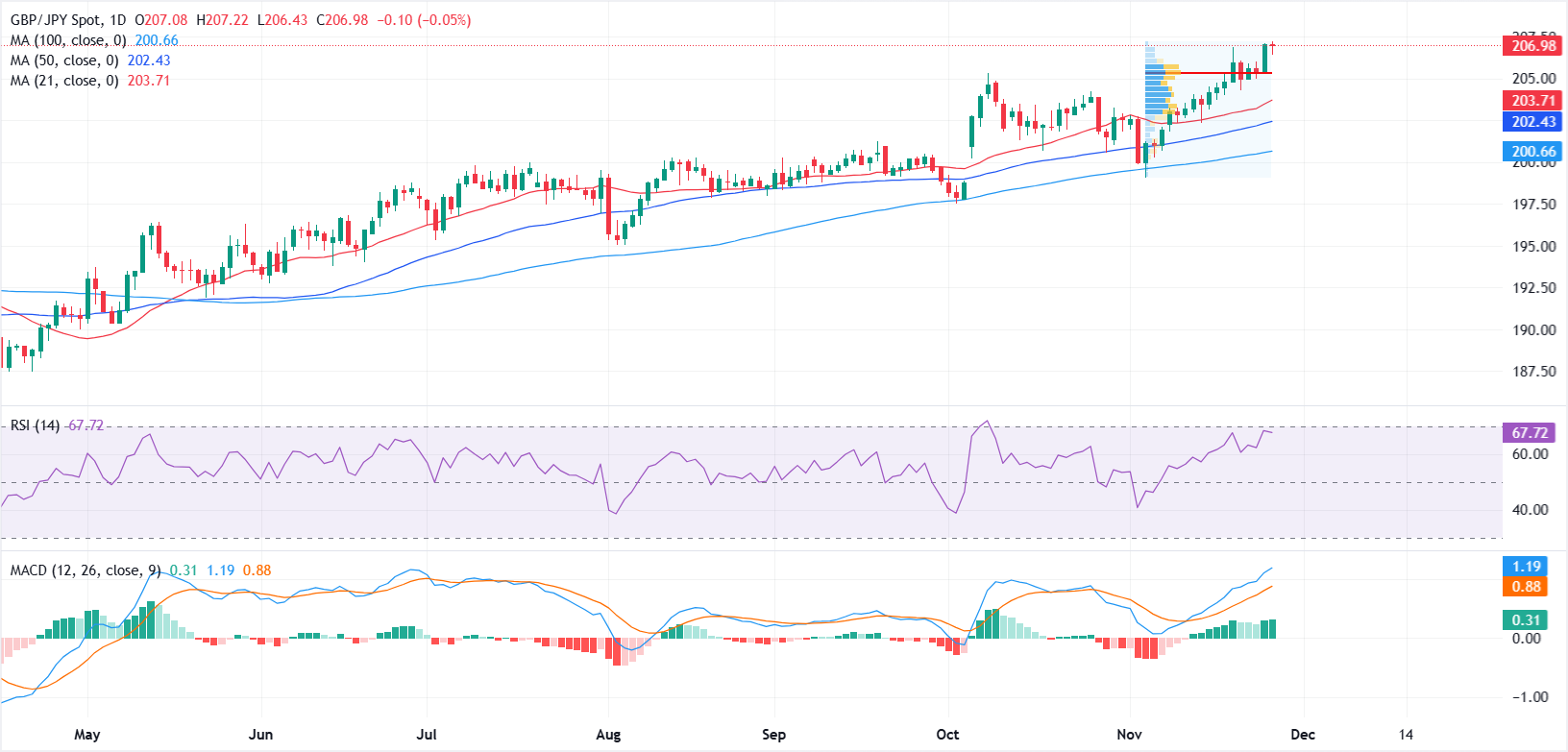GBP/JPY Price Forecast: Strong momentum signals point to further gains in the near term
- GBP/JPY holds firm after touching a fresh year-to-date high on Wednesday.
- Technical setup stays constructive above key moving averages, with the 205.00 psychological level acting as immediate support.
- MACD and RSI signals favour buyers, with momentum holding strong and no signs of exhaustion.
GBP/JPY holds steady near 207.00 on Thursday after touching a fresh year-to-date high on the previous day, with sentiment leaning in favour of the British Pound (GBP) following the United Kingdom’s Autumn Budget.
Meanwhile, the Japanese Yen (JPY) remains under sustained pressure across the board as traders focus on rising fiscal concerns in Japan and uncertainty over the timing of the Bank of Japan’s next rate hike, keeping the broader backdrop supportive for Sterling against the Yen.

From a technical perspective, the pair trades comfortably above its short, medium and long-term moving averages. The 205.00 psychological level, which sits close to this week’s low, acts as an initial floor, followed by the 21-day Simple Moving Average (SMA) at 203.70, which provides the first layer of dynamic support.
Momentum indicators remain aligned with buyers. The Moving Average Convergence Divergence (MACD) indicator shows the MACD line holding above the Signal line, while the histogram continues to widen in positive territory, which points to strengthening bullish momentum rather than exhaustion. The Relative Strength Index (RSI) trades near 66, upbeat yet still below the overbought region.
Near-term, the upside bias remains intact as long as GBP/JPY holds above the rising 21-day SMA. A shallow pullback would likely find support at 203.70, followed by the 50-day SMA at 202.43, while the 100-day SMA near 200.66 serves as a deeper cushion.
A break above Wednesday’s peak would open the door toward the 207.50-208.00 zone. A drop in the RSI toward 50 or a loss of momentum on the MACD would indicate consolidation rather than a trend reversal. The overall technical backdrop continues to support buying on dips.
Japanese Yen FAQs
The Japanese Yen (JPY) is one of the world’s most traded currencies. Its value is broadly determined by the performance of the Japanese economy, but more specifically by the Bank of Japan’s policy, the differential between Japanese and US bond yields, or risk sentiment among traders, among other factors.
One of the Bank of Japan’s mandates is currency control, so its moves are key for the Yen. The BoJ has directly intervened in currency markets sometimes, generally to lower the value of the Yen, although it refrains from doing it often due to political concerns of its main trading partners. The BoJ ultra-loose monetary policy between 2013 and 2024 caused the Yen to depreciate against its main currency peers due to an increasing policy divergence between the Bank of Japan and other main central banks. More recently, the gradually unwinding of this ultra-loose policy has given some support to the Yen.
Over the last decade, the BoJ’s stance of sticking to ultra-loose monetary policy has led to a widening policy divergence with other central banks, particularly with the US Federal Reserve. This supported a widening of the differential between the 10-year US and Japanese bonds, which favored the US Dollar against the Japanese Yen. The BoJ decision in 2024 to gradually abandon the ultra-loose policy, coupled with interest-rate cuts in other major central banks, is narrowing this differential.
The Japanese Yen is often seen as a safe-haven investment. This means that in times of market stress, investors are more likely to put their money in the Japanese currency due to its supposed reliability and stability. Turbulent times are likely to strengthen the Yen’s value against other currencies seen as more risky to invest in.